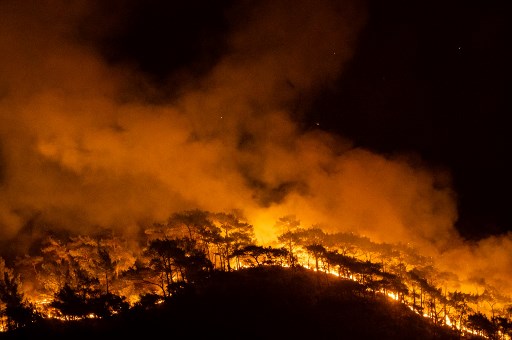
by Raziye AKKOC with AFP bureaus
ANKARA, Turkey (AFP) — Dozens of villages were evacuated in tourist hotspots in southern Turkey on Sunday as wildfires that have claimed eight lives raged for a fifth day, while blazes also hit Greece, Italy and Spain.
Fanned by soaring temperatures and strong winds — with experts saying that climate change increases both the frequency and intensity of such blazes — this year’s fire season has been significantly more destructive than the previous average, EU data shows.
Turkey is suffering its worst fires in at least a decade with nearly 95,000 hectares (235,000 acres) burnt so far this year, compared with an average of 13,516 at the same point in the years between 2008 and 2020.
A neighborhood in the tourist city of Bodrum has been evacuated, CNN Turk broadcaster reported, as strong winds fanned flames from the nearby Milas district.
Unable to leave by road, 540 residents were taken to hotels by boats, the channel said.
People were also evacuated from the resort city of Antalya, and two bodies were found in that region on Sunday, taking the number of people killed to eight.
After hitting record levels last month, temperatures are set to remain high.
A temperature of 49.1 degrees Celsius (120.3 Fahrenheit) was recorded in the southeastern town of Cizre on July 20.
And the mercury is expected to reach 40C in Antalya on Monday.
Turkey’s defense ministry released satellite images showing the extent of the damage, with forest areas turned black and smoke still visible.
President Recep Tayyip Erdogan has been criticized after it emerged that Turkey has no firefighting planes even though one-third of its territory is forested and fires are becoming increasingly frequent.
According to EU figures, Turkey has been hit by 133 wildfires in 2021 so far compared with an average of 43 by this point in the years between 2008 and 2020.
Greek ‘catastrophe’
Meanwhile a major blaze broke out early Saturday near Patras in the western Greece.
Five villages have been evacuated and eight people were hospitalized with burns and respiratory problems in the region, which remains on alert.
Around 20 homes have been burnt down, according to a provisional figure from the fire brigade.
The mayor of nearby village Aigialeias, Dimitris Kalogeropoulos, called it “an immense catastrophe”.
Flames consumed around 30 houses, barns and stables in the villages of Ziria, Kamares, Achaias and Labiri.
“We slept outside overnight, terrified that we would not have a house when we woke up,” a Labiri resident told Greek TV station Skai.
The seaside resort of Loggos was also evacuated, with nearly 100 residents and tourists sent to the nearby city of Aigio.
According to EU data, 13,500 hectares had been burnt in Greece, compared with an average of 7,500 at this point in the year from 2008-20.
‘Crazy summer’
Italy was again hit by fires after more than 20,000 hectares of forest, olive groves and crops were destroyed by a blaze in Sardinia last weekend.
More than 800 flare-ups were recorded this weekend, mainly in the south, Italy’s fire brigade said.
“In the last 24 hours, firefighters have carried out more than 800 interventions: 250 in Sicily, 130 in Puglia and Calabria, 90 in Lazio and 70 in Campania,” the brigade tweeted.
It added that firefighters were still battling blazes in the Sicilian cities of Catania, Palermo and Syracuse.
While the south of Italy has been burning, the north has suffered wild storms.
“The cost of the damage caused throughout the northern Italian countryside by the violent storms and hail during this crazy summer amounts to tens of millions of euros,” the Coldiretti agricultural organisation said.
In Spain, dozens of firefighters backed by water-dropping aircraft were battling a wildfire that broke out Saturday afternoon near the San Juan reservoir, about 70 kilometers (40 miles) east of Madrid.
Firefighters said Sunday they had managed to stabilize the blaze overnight but local authorities urged people to stay away from the reservoir, a popular bathing spot for residents of the Spanish capital.
© Agence France-Presse







